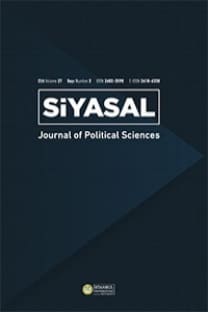Bir Siyasi İletişim Stili Olarak Popülizm: Akp’nin Popülist Siyasal Söyleminin Karşılaştırmalı Analizi
Bu çalışmanın ana amacı Türkiye’de siyasi söylemde var olan popülizmin derecesini ve türlerini sayısal veriler kullanarak
Anahtar Kelimeler:
Türkiye, Popülizm, Siyasi söylem, AKP, Siyasal islam
Populism As A Political Communication Style: A Comparative Analysis of AKP’s Political Discourse
This study, through quantitative analysis, aims to investigate the level and kind of populism in modern Turkish political
Keywords:
Turkey, Populism, Political discourse, AKP, Political islam,
___
- Albertazzi, D. ve McD. (2008), Twenty-First Century Populism, Palgrave Macmillan, London.
- Canovan, M. (1981), Populism, London Junction, London.
- Canovan, M. (1999), Trust the People! Populism and the Two Faces of Democracy. Political Studies, 47(1), 2-16.
- Çınar, M. (2017), Turkey’s ‘Western’ or ‘Muslim’ Identity and the AKP’s Civilizational Discourse, Turkish Studies, 19(2), 176-197.
- De La Torre, C. (2000), Populist Seduction in Latin America. Ohio University Press, Athens.
- Gümüşçü, Ş. ve Sert, D. (2009), The power of the Devout Bourgeoisie: The Case of the Justice and Development Party in Turkey. Middle Eastern Studies, 45(6). 953-968.
- Hawkins, K. A. (2009), Is Chávez Populist? Measuring Populist Discourse in Comparative Perspective. Comparative Political Studies. 42(8), 1040-1067.
- Hawkins, K. A. (2010), Venezuela’s Chavisma and Populism in Comparative Perspective, Cambridge University Press, New York.
- Jagers, J. ve Walgrave, S. (2007), Populism as Political Communication Style: an Empirical Study of Political Parties’ Discourse in Belgium. European Journal of Political Research, 46: 319-345.
- Kessel, S. V. (2011), Explaining the Electoral Performance of Populist Parties: The Netherlands as a Case Study. Perspectives on European Polities and Society, 12(1), 68-88.
- Knight, A. (1998), Populism and Neo-Populism in Latin America, Especially Mexico. Journal of Latin American Studies. 30(2), 223-248.
- Laclau, E. (2005), On Populist Reason. Verso, London. Lloyd, J. (2003), The Closing of the European Gates? The New Parties of Europe. The Poltical Quartely Publishing. Oxford.
- Özpek, B. B. ve Yaşar, N.T. (2017), “Populism and Foreign Policy in Turkey Under the AKP Rule”, Turkish Studies, 19(2), 198-216
- Mudde, C. (2004), The Populist Zeitgeist. Government and Opposition. 39(4), 541-563.
- Mudde, C. (2007), Populist Radical Right Parties in Europe. Cambridge University Press. Cambridge.
- Pauwels, T. (2011), Measuring Populism: A Quantitative Text Analysis of Party Literature in Belguim. Journal of Elections. 21(1), 97-119.
- Rooduijn, M. (2009a, May 28-29), The Concept of Populism in Comparative Research. A double Operationalization Strategy of Generalization and Particularization. Paper Presented at the politicologenetmaal, Nijmegen.
- Rooduijn, M. (2009b, Sebtember 10-12), A Populist Zeitgesit? Populist Parties and Mainstream Parties in the Netherlands and the United Kingdom, Paper Presented at the ECPR General Conference, Postdam,
- Selçuk, O. (2016), Strong Presidents and Weak Institutions: Populism in Turkey, Venezuela and Ecuador. Southeast European and Black Sea Studies. 16(4), 571-589.
- Stanley, B. (2008), The Thin Ideology of Populism. Journal of Political Ideologies. 13(1), 95-110.
- Taggart, P. (1995), New Populist Parties in Western Europe. West European Polities. 18(1), 34–51.
- Toprak, B. (1997), Türkiye’de Dinin Denetim İşlevi. Ersin Kalaycıoğlu – Yaşar Sarıbay (Ed.). Türkiye’de Siyaset: Süreklilik ve Değişim, (pp. 387-397). Der yayınları, İstanbul.
- Toprak, Z. (1992), Popülizm ve Türkiye’deki Boyutları. Cem Yayınları; Üniversite Öğretim Üyeleri Derneği. 1992, 41-65.
- Toprak, Z. (2013), Türkiye‘de Popülizm (1908-1923). Doğan Kitap, İstanbul.
- Yabancı, B. (2016), Populism as the Problem Child of Democracy: The AKP’s Enduring Appeal and the Use of Meso-Level Actors. Southeast European and Black Sea Studies. 16(4), 591-617.
- Yayın Aralığı: Yılda 2 Sayı
- Başlangıç: 1983
- Yayıncı: İstanbul Üniversitesi
